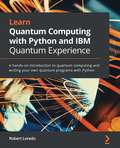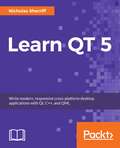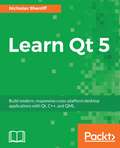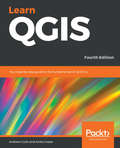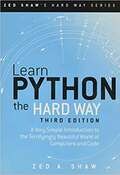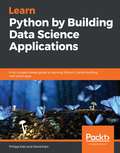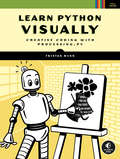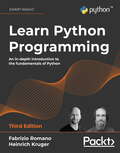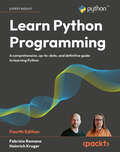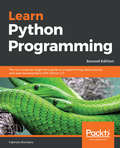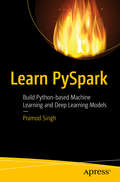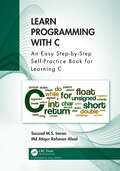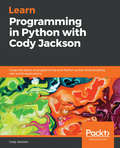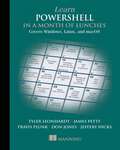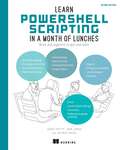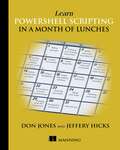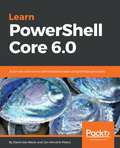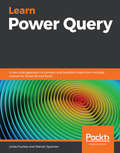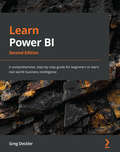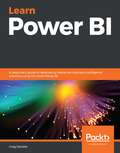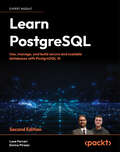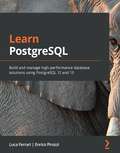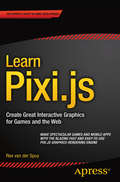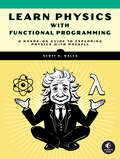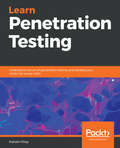- Table View
- List View
Learn Quantum Computing with Python and IBM Quantum Experience: A hands-on introduction to quantum computing and writing your own quantum programs with Python
by Robert LoredoA step-by-step guide to learning the implementation and associated methodologies in quantum computing with the help of the IBM Quantum Experience, Qiskit, and Python that will have you up and running and productive in no time Key Features Determine the difference between classical computers and quantum computers Understand the quantum computational principles such as superposition and entanglement and how they are leveraged on IBM Quantum Experience systems Run your own quantum experiments and applications by integrating with Qiskit Book Description IBM Quantum Experience is a platform that enables developers to learn the basics of quantum computing by allowing them to run experiments on a quantum computing simulator and a real quantum computer. This book will explain the basic principles of quantum mechanics, the principles involved in quantum computing, and the implementation of quantum algorithms and experiments on IBM's quantum processors. You will start working with simple programs that illustrate quantum computing principles and slowly work your way up to more complex programs and algorithms that leverage quantum computing. As you build on your knowledge, you'll understand the functionality of IBM Quantum Experience and the various resources it offers. Furthermore, you'll not only learn the differences between the various quantum computers but also the various simulators available. Later, you'll explore the basics of quantum computing, quantum volume, and a few basic algorithms, all while optimally using the resources available on IBM Quantum Experience. By the end of this book, you'll learn how to build quantum programs on your own and have gained practical quantum computing skills that you can apply to your business. What you will learn Explore quantum computational principles such as superposition and quantum entanglement Become familiar with the contents and layout of the IBM Quantum Experience Understand quantum gates and how they operate on qubits Discover the quantum information science kit and its elements such as Terra and Aer Get to grips with quantum algorithms such as Bell State, Deutsch-Jozsa, Grover's algorithm, and Shor's algorithm How to create and visualize a quantum circuit Who this book is for This book is for Python developers who are looking to learn quantum computing and put their knowledge to use in practical situations with the help of IBM Quantum Experience. Some background in computer science and high-school-level physics and math is required.
Learn Qt 5: Build modern, responsive cross-platform desktop applications with Qt, C++, and QML
by Nicholas SherriffLearn the fundamentals of QT 5 framework to develop interactive cross-platform applications Key Features A practical guide on the fundamentals of application development with QT 5 Learn to write scalable, robust and adaptable C++ code with QT Deploy your application on different platforms such as Windows, Mac OS, and Linux Book Description Qt is a mature and powerful framework for delivering sophisticated applications across a multitude of platforms. It has a rich history in the Linux world, is widely used in embedded devices, and has made great strides in the Mobile arena over the past few years. However, in the Microsoft Windows and Apple Mac OS X worlds, the dominance of C#/.NET and Objective-C/Cocoa means that Qt is often overlooked. This book demonstrates the power and flexibility of the Qt framework for desktop application development and shows how you can write your application once and deploy it to multiple operating systems. Build a complete real-world line of business (LOB) solution from scratch, with distinct C++ library, QML user interface, and QtTest-driven unit-test projects. This is a suite of essential techniques that cover the core requirements for most LOB applications and will empower you to progress from a blank page to shipped application. What you will learn · Install and configure the Qt Framework and Qt Creator IDE · Create a new multi-project solution from scratch and control every aspect of it with QMake · Implement a rich user interface with QML · Learn the fundamentals of QtTest and how to integrate unit testing · Build self-aware data entities that can serialize themselves to and from JSON · Manage data persistence with SQLite and CRUD operations · Reach out to the internet and consume an RSS feed · Produce application packages for distribution to other usersWho this book is for This book is for application developers who want a powerful and flexible framework to create modern, responsive applications on Microsoft Windows, Apple Mac OS X, and Linux desktop platforms. You should be comfortable with C++ but no prior knowledge of Qt or QML is required.
Learn Qt 5: Build Modern, Responsive Cross-platform Desktop Applications With Qt, C++, And Qml
by Nicholas SherriffQt is a mature and powerful framework for delivering sophisticated applications across a multitude of platforms. It has a rich history in the Linux world, is widely used in embedded devices and has made great strides in the Mobile arena over the past few years. However, in the Microsoft Windows and Apple Mac OS X worlds, the dominance of C#/.NET and Objective-C/Cocoa mean that Qt is often overlooked.) solution from scratch, with distinct library, user interface and unit test projects.
Learn QGIS: Your step-by-step guide to the fundamental of QGIS 3.4, 4th Edition
by Anita Graser Andrew CuttsLearn to view, edit and analyse geospatial data using QGIS and Python 3 Key Features *Leverage the power of QGIS to add professionalism to your maps *Explore and work with the newly released features like Python 3, GeoPackage, 3D views, Print layouts in QGIS 3.4 *Build your own plugins and customize maps using QT designer Book Description QGIS 3.4 is the first LTR (long term release) of QGIS version 3. This is a giant leap forward for the project with tons of new features and impactful changes. Learn QGIS is fully updated for QGIS 3.4, covering its processing engine update, Python 3 de-facto coding environment, and the GeoPackage format. This book will help you get started on your QGIS journey, guiding you to develop your own processing pathway. You will explore the user interface, loading your data, editing, and then creating data. QGIS often surprises new users with its mapping capabilities; you will discover how easily you can style and create your first map. But that's not all! In the final part of the book, you'll learn about spatial analysis and the powerful tools in QGIS, and conclude by looking at Python processing options. By the end of the book, you will have become proficient in geospatial analysis using QGIS and Python. What you will learn *Explore various ways to load data into QGIS *Understand how to style data and present it in a map *Create maps and explore ways to expand them *Get acquainted with the new processing toolbox in QGIS 3.4 *Manipulate your geospatial data and gain quality insights *Understand how to customize QGIS 3.4 *Work with QGIS 3.4 in 3D Who this book is for If you are a developer or consultant familiar with the basic functions and processes of GIS and want to learn how to use QGIS to analyze geospatial data and create rich mapping applications, this book is for you. You'll also find this book useful if you're new to QGIS and wish to grasp its fundamentals
Learn Python the Hard Way: A Very Simple Introduction to the Terrifyingly Beautiful World of Computers and Code
by Zed ShawZed Shaw has perfected the world's best system for learning Python. Follow it and you will succeed-just like the hundreds of thousands of beginners Zed has taught to date! You bring the discipline, commitment, and persistence; the author supplies everything else. <p><p> In Learn Python the Hard Way, Third Edition, you'll learn Python by working through 52 brilliantly crafted exercises. Read them. Type their code precisely. (No copying and pasting!) Fix your mistakes. Watch the programs run. As you do, you'll learn how software works; what good programs look like; how to read, write, and think about code; and how to find and fix your mistakes using tricks professional programmers use. Most importantly, you'll learn the following, which you need to start writing excellent Python software of your own.
Learn Python by Building Data Science Applications: A fun, project-based guide to learning Python 3 while building real-world apps
by David Katz Philipp KatsUnderstand the constructs of the Python programming language and use them to build data science projects Key Features Learn the basics of developing applications with Python and deploy your first data application Take your first steps in Python programming by understanding and using data structures, variables, and loops Delve into Jupyter, NumPy, Pandas, SciPy, and sklearn to explore the data science ecosystem in Python Book Description Python is the most widely used programming language for building data science applications. Complete with step-by-step instructions, this book contains easy-to-follow tutorials to help you learn Python and develop real-world data science projects. The “secret sauce” of the book is its curated list of topics and solutions, put together using a range of real-world projects, covering initial data collection, data analysis, and production. This Python book starts by taking you through the basics of programming, right from variables and data types to classes and functions. You'll learn how to write idiomatic code and test and debug it, and discover how you can create packages or use the range of built-in ones. You'll also be introduced to the extensive ecosystem of Python data science packages, including NumPy, Pandas, scikit-learn, Altair, and Datashader. Furthermore, you'll be able to perform data analysis, train models, and interpret and communicate the results. Finally, you'll get to grips with structuring and scheduling scripts using Luigi and sharing your machine learning models with the world as a microservice. By the end of the book, you'll have learned not only how to implement Python in data science projects, but also how to maintain and design them to meet high programming standards. What you will learn Code in Python using Jupyter and VS Code Explore the basics of coding – loops, variables, functions, and classes Deploy continuous integration with Git, Bash, and DVC Get to grips with Pandas, NumPy, and scikit-learn Perform data visualization with Matplotlib, Altair, and Datashader Create a package out of your code using poetry and test it with PyTest Make your machine learning model accessible to anyone with the web API Who this book is for If you want to learn Python or data science in a fun and engaging way, this book is for you. You'll also find this book useful if you're a high school student, researcher, analyst, or anyone with little or no coding experience with an interest in the subject and courage to learn, fail, and learn from failing. A basic understanding of how computers work will be useful.
Learn Python Visually: Creative Coding with Processing.py
by Tristan BunnAn accessible, visual, and creative approach to teaching core coding concepts using Python's Processing.py, an open-source graphical development environment.This beginners book introduces non-programmers to the fundamentals of computer coding within a visual, arts-focused context. Tristan Bunn&’s remarkably effective teaching approach is designed to help you visualize core programming concepts while you make cool pictures, animations, and simulations using Python Mode for the open-source Processing development environment. Right from the first chapter, you'll produce and manipulate colorful drawings, shapes and patterns as Bunn walks you through a series of easy-to-follow graphical coding projects that grow increasingly complex. You&’ll go from drawing with code to animating a bouncing DVD screensaver and practicing data-visualization techniques. Along the way, you&’ll encounter creative-yet-practical skill-building challenges that relate to everything from video games, cars, and coffee, to fine art, amoebas, and Pink Floyd. As you grow more fluent in both Python and programming in general, topics shift toward the mastery of algorithmic thinking, as you explore periodic motion, Lissajous curves, and using classes to create objects. You&’ll learn about: • Basic coding theories and concepts, like variables, data types, pixel coordinates, control flow and algorithms • Writing code that produces drawings, patterns, animations, data visualizations, user interfaces, and simulations • Using conditional statements, iteration, randomness, lists and dictionaries • Defining functions, reducing repetition, and making your code more modular • How to write classes, and create objects to structure code more efficiently In addition to giving you a good grounding in general programming, the skills and knowledge you&’ll gain in this book are your entry point to coding for an ever-expanding horizon of creative technologies.
Learn Python Programming: An in-depth introduction to the fundamentals of Python, 3rd Edition
by Fabrizio Romano Heinrich KrugerGet up and running with Python through concise tutorials and practical projects in this fully updated editionKey FeaturesDiscover how to think like a Python programmerExtensively revised with richer examples, Python 3.9 syntax, and new chapters on APIs and packaging and distributing Python codeLearn the fundamentals of Python through real-world projects in API development, GUI programming, and data scienceBook DescriptionLearn Python Programming, Third Edition is both a theoretical and practical introduction to Python, an extremely flexible and powerful programming language that can be applied to many disciplines. This book will make learning Python easy and give you a thorough understanding of the language. You'll learn how to write programs, build modern APIs, and work with data by using renowned Python data science libraries.This revised edition covers the latest updates on API management, packaging applications, and testing. There is also broader coverage of context managers and an updated data science chapter.The book empowers you to take ownership of writing your software and become independent in fetching the resources you need. You will have a clear idea of where to go and how to build on what you have learned from the book. Through examples, the book explores a wide range of applications and concludes by building real-world Python projects based on the concepts you have learned.What you will learnGet Python up and running on Windows, Mac, and LinuxWrite elegant, reusable, and efficient code in any situationAvoid common pitfalls like duplication, complicated design, and over-engineeringUnderstand when to use the functional or object-oriented approach to programmingBuild a simple API with FastAPI and program GUI applications with TkinterGet an initial overview of more complex topics such as data persistence and cryptographyFetch, clean, and manipulate data, making efficient use of Python's built-in data structuresWho this book is forThis book is for anyone who has some programming experience, but not necessarily with Python. Some knowledge of basic programming concepts will come in handy, although it is not a requirement.
Learn Python Programming: A comprehensive, up-to-date, and definitive guide to learning Python
by Fabrizio Romano Heinrich KrugerThis edition offers updated content covering Python 3.9 to 3.12, new chapters on type hinting and CLI applications, and expanded practical examples, making it the ideal resource for both new and experienced Python programmersKey FeaturesCreate and deploy APIs and CLI applications, leveraging Python’s strengths in scripting and automationStay current with the latest features and improvements in Python, including pattern matching and the latest exception handling syntaxEngage with new real-world examples and projects, including competitive programming problems, to solidify your understanding of PythonBook DescriptionLearn Python Programming, Fourth Edition, provides a comprehensive, up-to-date introduction to Python programming, covering fundamental concepts and practical applications. This edition has been meticulously updated to include the latest features from Python versions 3.9 to 3.12, new chapters on type hinting and CLI applications, and updated examples reflecting modern Python web development practices. This Python book empowers you to take ownership of writing your software and become independent in fetching the resources you need. By the end of this book, you will have a clear idea of where to go and how to build on what you have learned from the book. Through examples, the book explores a wide range of applications and concludes by building real-world Python projects based on the concepts you have learned. This Python book offers a clear and practical guide to mastering Python and applying it effectively in various domains, such as data science, web development, and automation.What you will learnInstall and set up Python on Windows, Mac, and LinuxWrite elegant, reusable, and efficient codeAvoid common pitfalls such as duplication and over-engineeringUse functional and object-oriented programming approaches appropriatelyBuild APIs with FastAPI and program CLI applicationsUnderstand data persistence and cryptography for secure applicationsManipulate data efficiently using Python's built-in data structuresPackage your applications for distribution via the Python Package Index (PyPI)Solve competitive programming problems with PythonWho this book is forThis Python programming book is for everyone who wants to learn Python from scratch, as well as experienced programmers looking for a reference book. Prior knowledge of basic programming concepts will help you follow along, but it’s not a prerequisite
Learn Python Programming: A beginner's guide to learning the fundamentals of Python language to write efficient, high-quality code, 2nd Edition
by Fabrizio RomanoBuild a solid foundation in coding by utilizing the language and its core characteristicsKey FeaturesLeverage the features of Python programming through easy-to-follow examplesDevelop a strong set of programming skills that can be applied on all platformsCreate GUIs and data science-based applicationsBook DescriptionLearn Python Programming creates a foundation for those who are interested in developing their skills in Python programming. The book starts with the fundamentals of programming with Python and ends by exploring different topics such as GUIs and real-world apps.You will begin by exploring the foundations of and fundamental topics on Python and learn to manipulate them. Then, you'll explore different programming paradigms that will allow you to find the best approach to a situation, and you’ll also understand how to carry out performance optimization as well as effective debugging.As you make your way through the chapters, you'll control the flow of a program, and persist and utilize an interchange format to exchange data. You'll also walk through cryptographic services in Python and understand secure tokens. Throughout, the book covers various types of applications, and it concludes with building real-world applications based on all the concepts that you learned.By the end of the book, you'll have a proper understanding of the Python language and a solid grasp on how to work with data. You'll know how to quickly build a website and harness the power of Python's renowned data science libraries.What you will learnGet Python up and running on Windows, Mac, and LinuxGrasp fundamental concepts of coding using data structures and control flowWrite elegant, reusable, and efficient code in any situationUnderstand when to use the functional or object-oriented programming (OOP) approachWalk through the basics of security and concurrent/asynchronous programmingCreate bulletproof, reliable software by writing testsExplore examples of GUIs, scripting, and data scienceWho this book is forLearn Python Programming is for individuals with relatively little experience in coding or Python. It's also ideal for aspiring programmers who need to write scripts or programs to accomplish tasks. The book takes you all the way to creating a full-fledged application.
Learn PySpark: Build Python-based Machine Learning and Deep Learning Models
by Pramod SinghLeverage machine and deep learning models to build applications on real-time data using PySpark. This book is perfect for those who want to learn to use this language to perform exploratory data analysis and solve an array of business challenges.You'll start by reviewing PySpark fundamentals, such as Spark’s core architecture, and see how to use PySpark for big data processing like data ingestion, cleaning, and transformations techniques. This is followed by building workflows for analyzing streaming data using PySpark and a comparison of various streaming platforms. You'll then see how to schedule different spark jobs using Airflow with PySpark and book examine tuning machine and deep learning models for real-time predictions. This book concludes with a discussion on graph frames and performing network analysis using graph algorithms in PySpark. All the code presented in the book will be available in Python scripts on Github.What You'll LearnDevelop pipelines for streaming data processing using PySpark Build Machine Learning & Deep Learning models using PySpark latest offeringsUse graph analytics using PySpark Create Sequence Embeddings from Text data Who This Book is For Data Scientists, machine learning and deep learning engineers who want to learn and use PySpark for real time analysis on streaming data.
Learn Programming with C: An Easy Step-by-Step Self-Practice Book for Learning C
by Md Atiqur Ahad Sazzad M.S. ImranAuthored by two standout professors in the field of Computer Science and Technology with extensive experience in instructing, Learn Programming with C: An Easy Step-by Step Self-Practice Book for Learning C is a comprehensive and accessible guide to programming with one of the most popular languages. Meticulously illustrated with figures and examples, this book is a comprehensive guide to writing, editing, and executing C programs on different operating systems and platforms, as well as how to embed C programs into other applications and how to create one’s own library. A variety of questions and exercises are included in each chapter to test the readers’ knowledge. Written for the novice C programmer, especially undergraduate and graduate students, this book’s line-by-line explanation of code and succinct writing style makes it an excellent companion for classroom teaching, learning, and programming labs.
Learn Programming in Python with Cody Jackson: Grasp the basics of programming and Python syntax while building real-world applications
by Cody JacksonKick-start your development journey with this end-to-end guide that covers Python programming fundamentals along with application developmentKey FeaturesGain a solid understanding of Python programming with coverage of data structures and Object-Oriented Programming (OOP)Design graphical user interfaces for desktops with libraries such as Kivy and TkinterWrite elegant, reusable, and efficient code Book DescriptionPython is a cross-platform language used by organizations such as Google and NASA. It lets you work quickly and efficiently, allowing you to concentrate on your work rather than the language. Based on his personal experiences when learning to program, Learn Programming in Python with Cody Jackson provides a hands-on introduction to computer programming utilizing one of the most readable programming languages–Python. It aims to educate readers regarding software development as well as help experienced developers become familiar with the Python language, utilizing real-world lessons to help readers understand programming concepts quickly and easily. The book starts with the basics of programming, and describes Python syntax while developing the skills to make complete programs. In the first part of the book, readers will be going through all the concepts with short and easy-to-understand code samples that will prepare them for the comprehensive application built in parts 2 and 3. The second part of the book will explore topics such as application requirements, building the application, testing, and documentation. It is here that you will get a solid understanding of building an end-to-end application in Python. The next part will show you how to complete your applications by converting text-based simulation into an interactive, graphical user interface, using a desktop GUI framework. After reading the book, you will be confident in developing a complete application in Python, from program design to documentation to deployment.What you will learnUse the interactive shell for prototyping and code execution, including variable assignment Deal with program errors by learning when to manually throw exceptions Employ exceptions for code management Enhance code by utilizing Python's built-in shortcuts to improve efficiency and make coding easier Interact with files and package Python data for network transfer or storage Understand how tests drive code writing, and vice versaExplore the different frameworks that are available for GUI developmentWho this book is forLearn Programming in Python with Cody Jackson is for beginners or novice programmers who have no programming background and wish to take their first step in software development. This book will also be beneficial for intermediate programmers and will provide deeper insights into effective coding practices in Python.
Learn PowerShell in a Month of Lunches, Fourth Edition: Covers Windows, Linux, and macOS
by Travis Plunk James Petty Tyler LeonhardtDesigned for busy IT professionals, this innovative guide will take you from the basics to PowerShell proficiency through 25 tutorials you can do in your lunch break.In Learn PowerShell in a Month of Lunches, Fourth Edition you will learn: Discoverability with the Help system Background jobs and automation techniques Simple scripting to automate repetitive tasks Managing cloud services from major cloud providers Extending PowerShell with commands Common syntax and commands cheat sheet Learn PowerShell in a Month of Lunches, Fourth Edition is a task-focused guide for administering your systems using PowerShell. It covers core language features and admin tasks, with each chapter a mini-tutorial you can easily complete in under an hour. Discover how PowerShell works on different operating systems, and start automating tasks so they take just a few seconds to complete. No previous scripting experience required. The book is based on the bestselling Learn Windows PowerShell in a Month of Lunches by community legends Don Jones and Jeffery Hicks. PowerShell team members Travis Plunk and Tyler Leonhardt and Microsoft MVP James Petty have updated this edition to the latest version of PowerShell, including its multi-platform expansion into Linux and macOS. About the technology PowerShell gives you complete command line control over admin tasks like adding users, exporting data, and file management. Whether you&’re writing one-liners or building complex scripts to manage cloud resources and CI/CD pipelines, PowerShell can handle the task. And now that PowerShell is truly cross-platform, you don&’t have to switch scripting languages when you move between Windows, Linux, and macOS. About the book Learn PowerShell in a Month of Lunches, Fourth Edition is a new edition of the bestseller that introduced PowerShell to over 100,000 readers. With bite-sized lessons and hands-on exercises, this amazing book guides you from your first command to writing and debugging reusable scripts for Windows, Linux, and macOS. Set aside just an hour a day and you&’ll soon be tackling increasingly complex automation tasks with PowerShell. What's inside Discoverability with the Help system PowerShell on macOS and Linux Background jobs and automation techniques Managing cloud services from major cloud providers Common syntax and commands cheat sheet About the reader No previous experience with PowerShell or Bash required. About the author James Petty is CEO of PowerShell.org and The DevOps Collective, and a Microsoft MVP. Travis Plunk is an engineer on the PowerShell team. Tyler Leonhardt is an engineer on Visual Studio Code. Don Jones and Jeffery Hicks are the original authors of Learn Windows PowerShell in a Month of Lunches.
Learn PowerShell Scripting in a Month of Lunches, Second Edition: Write and organize scripts and tools (In a Month of Lunches)
by Don Jones Jeffery Hicks James PettyAutomate complex tasks and processes with PowerShell scripts. This amazing book teaches you how to write, test, and organize high-quality, reusable scripts for Windows, Linux, and cloud-based systems.Learn PowerShell Scripting in a Month of Lunches, Second Edition takes you beyond command-line PowerShell and opens up the amazing world of scripting and automation. In just 27 bite-sized lessons, you&’ll learn to write scripts that can eliminate repetitive manual tasks, create custom reusable tools, and build effective pipelines and workflows. In Learn PowerShell Scripting in a Month of Lunches, Second Edition you&’ll learn: Setting up a reliable scripting environment Designing functions and scripts Effective pipeline usage Scripting and security Dealing with errors and bugs Source control with git Sharing and publishing scripts Professional-grade scripting practices The PowerShell language lets you write scripts to control nearly every aspect of Windows. Just master a few straightforward scripting skills, and you'll save yourself from hours of tedious tasks. This revised second edition is fully updated to PowerShell&’s latest version, including hands-on examples that perfectly demonstrate modern PowerShell&’s cross-platform applications. About the technology You can write PowerShell scripts to automate nearly any admin task on Windows, Linux, and macOS. This book shows you how! In just 27 short lessons you can complete on your lunch break, you&’ll learn to create, organize, test, and share scripts and tools that will save you hours of time in your daily work. About the book Learn PowerShell Scripting in a Month of Lunches, Second Edition is a hands-on introduction to PowerShell automation and toolbuilding. Updated for the latest version of PowerShell, this thoroughly revised bestseller teaches you how to write efficient scripts, find and squash bugs, and organize your tools into libraries. Along the way, you&’ll even pick up tips for securing and managing Linux and macOS systems. What's inside Setting up a reliable scripting environment Designing functions and scripts Effective pipeline usage Sharing and publishing scripts About the reader Beginning to intermediate knowledge of PowerShell required. About the author James Petty is CEO of PowerShell.org and The DevOps Collective and a Microsoft MVP. Don Jones and Jeffery Hicks are the authors of the first edition of Learn PowerShell Scripting in a Month of Lunches. Table of Contents PART 1 1 Before you begin 2 Setting up your scripting environment 3 WWPD: What would PowerShell do? 4 Review: Parameter binding and the PowerShell pipeline 5 Scripting language: A crash course 6 The many forms of scripting (and which to choose) 7 Scripts and security PART 2 8 Always design first 9 Avoiding bugs: Start with a command 10 Building a basic function and script module 11 Getting started with advanced functions 12 Objects: The best kind of output 13 Using all the streams 14 Simple help: Making a comment 15 Errors and how to deal with them 16 Filling out a manifest PART 3 17 Changing your brain when it comes to scripting 18 Professional-grade scripting 19 An introduction to source control with Git 20 Pestering your script 21 Signing your script 22 Publishing your script PART 4 23 Squashing bugs 24 Enhancing script output presentation 25 Wrapping up the .NET Framework 26 Storing data—not in Excel! 27 Never the end
Learn PowerShell Scripting in a Month of Lunches
by Don Jones Jeffery HicksSummaryDiscover how scripting is different from command-line PowerShell, as you explore concrete hands-on examples in this handy guide. The book includes and expands on many of the techniques presented in Learn PowerShell Toolmaking in a Month of Lunches.Purchase of the print book includes a free eBook in PDF, Kindle, and ePub formats from Manning Publications.About the TechnologyAutomate it! With Microsoft's PowerShell language, you can write scripts to control nearly every aspect of Windows. Just master a few straightforward scripting skills, and you'll be able to eliminate repetitive manual tasks, create custom reusable tools, and build effective pipelines and workflows. Once you start scripting in PowerShell, you'll be amazed at how many opportunities you'll find to save time and effort. About the BookLearn PowerShell Scripting in a Month of Lunches teaches you how to expand your command-line PowerShell skills into effective scripts and tools. In 27 bite-size lessons, you'll discover instantly useful techniques for writing efficient code, finding and squashing bugs, organizing your scripts into libraries, and much more. Advanced scripters will even learn to access the .NET Framework, store data long term, and create nice user interfaces.What's InsideDesigning functions and scriptsEffective pipeline usageDealing with errors and bugsProfessional-grade scripting practicesAbout the Reader Written for devs and IT pros comfortable with PowerShell and Windows. About the AuthorsDon Jones is a PowerShell MVP, speaker, and trainer who has written dozens of books on information technology topics. Jeffery Hicks is a PowerShell MVP and an independent consultant, trainer, and author. Don and Jeff coauthored Manning's Learn Windows PowerShell in a Month of Lunches, Learn PowerShell Toolmaking in a Month of Lunches, and PowerShell in Depth. Table of ContentsPART 1 - INTRODUCTION TO SCRIPTING Before you begin Setting up your scripting environment WWPD: what would PowerShell do? Review: parameter binding and the PowerShell pipeline Scripting language crash course The many forms of scripting (and which to use) Scripts and security PART 2 - BUILDING A POWERSHELL SCRIPTAlways design first Avoiding bugs: start with a command Building a basic function and script module Going advanced with your function Objects: the best kind of output Using all the pipelines Simple help: making a comment Dealing with errors Filling out a manifest PART 3 - GROWN-UP SCRIPTING Changing your brain when it comes to scripting Professional-grade scripting An introduction to source control with git Pestering your script Signing your script Publishing your script PART 4 - ADVANCED TECHNIQUES Squashing bugs Making script output prettier Wrapping up the .NET Framework Storing data-not in Excel! Never the end
Learn PowerShell Core 6.0: Automate and control administrative tasks using DevOps principles
by David Das Neves Jan-Hendrik PetersEnhance your skills in expert module development, deployment, security, DevOps, and cloudKey FeaturesA step-by-step guide to get you started with PowerShell Core 6.0Harness the capabilities of PowerShell Core 6.0 to perform simple to complex administration tasksLearn core administrative concepts such as scripting, pipelines, and DSCBook DescriptionBeginning with an overview of the different versions of PowerShell, Learn PowerShell Core 6.0 introduces you to VSCode and then dives into helping you understand the basic techniques in PowerShell scripting. You will cover advanced coding techniques, learn how to write reusable code as well as store and load data with PowerShell.This book will help you understand PowerShell security and Just Enough Administration, enabling you to create your own PowerShell repository. The last set of chapters will guide you in setting up, configuring, and working with Release Pipelines in VSCode and VSTS, and help you understand PowerShell DSC. In addition to this, you will learn how to use PowerShell with Windows, Azure, Microsoft Online Services, SCCM, and SQL Server. The final chapter will provide you with some use cases and pro tips.By the end of this book, you will be able to create professional reusable code using security insight and knowledge of working with PowerShell Core 6.0 and its most important capabilities.What you will learnGet to grips with Powershell Core 6.0Explore basic and advanced PowerShell scripting techniquesGet to grips with Windows PowerShell SecurityWork with centralization and DevOps with PowerShellImplement PowerShell in your organization through real-life examplesLearn to create GUIs and use DSC in productionWho this book is forIf you are a Windows administrator or a DevOps user who wants to leverage PowerShell to automate simple to complex tasks, then this book is for you. Whether you know nothing about PowerShell or just enough to get by, this guide will give you what you need to go to take your scripting to the next level. You’ll also find this book useful if you’re a PowerShell expert looking to expand your knowledge in areas such as PowerShell Security and DevOps.
Learn Power Query: A low-code approach to connect and transform data from multiple sources for Power BI and Excel
by Linda Foulkes Warren SparrowDiscover how you can combine data from various sources to create data models to suit your business requirements with the help of this clear and concise guide Key Features Understand how Power Query overcomes the shortcomings of Excel Power Pivot in handling complex data Create customized dashboards and multi-dimensional reports using Power Query and Power BI Learn the Power Query M language and write advanced queries using custom functions Book Description Power Query is a data connection technology that allows you to connect, combine, and refine data from multiple sources to meet your business analysis requirements. With this Power Query book, you'll be empowered to work with a variety of data sources to create interactive reports and dashboards using Excel and Power BI. You'll start by learning how to access Power Query across different versions of Excel and install the Power BI engine. After you've explored Power Pivot, you'll see why Excel users find it challenging to clean data in Power Pivot and learn how Power Query can help to tackle the problem. The book will show you how to transform data using the Query Editor and write functions in Power Query. A dedicated section will focus on functions such as IF, Index, and Modulo, and creating parameters to alter query paths in a table. You'll also work with dashboards, get to grips with multi-dimensional reporting, and create automated reports. As you advance, you'll cover the M formula language in Power Query, delve into the basic M syntax, and write the M query language with the help of examples such as loading all library functions offline in Excel and Power BI. Finally, the book will demonstrate the difference between M and DAX and show how results are produced in M. By the end of this book, you'll be ready to create impressive dashboards and multi-dimensional reports in Power Query and turn data into valuable insights. What you will learn Convert worksheet data into a table format ready for query output Create a dynamic connection between an Access database and Excel workbook Reshape tabular data by altering rows, columns, and tables using various Power Query tools Create new columns automatically from filenames and sheet tabs, along with multiple Excel data files Streamline and automate reports from multiple sources Explore different customization options to get the most out of your dashboards Understand the difference between the DAX language and Power Query's M language Who this book is for This Power Query book is for business analysts, data analysts, BI professionals, and Excel users looking to take their skills to the next level by learning how to collect, combine, and transform data into insights using Power Query. Working knowledge of Excel and experience in constructing and troubleshooting Excel formulas and functions is expected.
Learn Power BI: A comprehensive, step-by-step guide for beginners to learn real-world business intelligence, 2nd Edition
by Greg DecklerLearn how to use Power BI to deliver the insights needed to help your enterprise survive and thriveKey FeaturesLearn simple through to advanced Power BI features in a clear, concise way using real-world examplesDevelop powerful analytical models and reports that extract key business insightsPublish, share and collaborate on impressive reports, dashboards, apps, and goalsBook DescriptionTo succeed in today's transforming business world, organizations need business intelligence capabilities to make smarter decisions faster than ever before. This updated second edition of Learn Power BI takes you on a journey of data exploration and discovery, using Microsoft Power BI to ingest, cleanse, and organize data in order to unlock key business insights that can then be shared with others. This newly revised and expanded edition of Learn Power BI covers all of the latest features and interface changes and takes you through the fundamentals of business intelligence projects, how to deploy, adopt, and govern Power BI within your organization, and how to leverage your knowledge in the marketplace and broader ecosystem that is Power BI. As you progress, you will learn how to ingest, cleanse, and transform your data into stunning visualizations, reports, and dashboards that speak to business decision-makers. By the end of this Power BI book, you will be fully prepared to be the data analysis hero of your organization – or even start a new career as a business intelligence professional.What you will learnGet up and running quickly with Power BIUnderstand and plan your business intelligence projectsConnect to and transform data using Power QueryCreate data models optimized for analysis and reportingPerform simple and complex DAX calculations to enhance analysisDiscover business insights and create professional reportsCollaborate via Power BI dashboards, apps, goals, and scorecardsDeploy and govern Power BI, including using deployment pipelinesWho this book is forIf you're an IT manager, data analyst, or BI user new to using Power BI for solving business intelligence problems, this book is for you. You'll also find this book helpful if you want to migrate from other BI tools to create powerful and interactive dashboards. No experience of working with Power BI is expected.
Learn Power BI: A beginner's guide to developing interactive business intelligence solutions using Microsoft Power BI
by Greg DecklerSolve business challenges with Microsoft Power BI's advanced visualization and data analysis techniques Key Features Create effective storytelling reports by implementing simple-to-intermediate Power BI features Develop powerful analytical models to extract key insights for changing business needs Build, publish, and share impressive dashboards for your organization Book Description To succeed in today's transforming business world, organizations need business intelligence capabilities to make smarter decisions faster than ever before. This Power BI book is an entry-level guide that will get you up and running with data modeling, visualization, and analytical techniques from scratch. You'll find this book handy if you want to get well-versed with the extensive Power BI ecosystem. You'll start by covering the basics of business intelligence and installing Power BI. You'll then learn the wide range of Power BI features to unlock business insights. As you progress, the book will take you through how to use Power Query to ingest, cleanse, and shape your data, and use Power BI DAX to create simple to complex calculations. You'll also be able to add a variety of interactive visualizations to your reports to bring your data to life. Finally, you'll gain hands-on experience in creating visually stunning reports that speak to business decision makers, and see how you can securely share these reports and collaborate with others. By the end of this book, you'll be ready to create simple, yet effective, BI reports and dashboards using the latest features of Power BI. What you will learn Explore the different features of Power BI to create interactive dashboards Use the Query Editor to import and transform data Perform simple and complex DAX calculations to enhance analysis Discover business insights and tell a story with your data using Power BI Explore data and learn to manage datasets, dataflows, and data gateways Use workspaces to collaborate with others and publish your reports Who this book is for If you're an IT manager, data analyst, or BI user new to using Power BI for solving business intelligence problems, this book is for you. You'll also find this book useful if you want to migrate from other BI tools to create powerful and interactive dashboards. No experience of working with Power BI is expected.
Learn PostgreSQL: Use, manage, and build secure and scalable databases with PostgreSQL 16
by Luca Ferrari Enrico PirozziThis new edition will help you learn PostgreSQL from scratch with the latest version, providing a complete focused view on aspects like configuration, high performance, partitioning, backup, server-side programming and replication. Purchase of the print or Kindle book includes a free eBook in PDF format.Key FeaturesLearn the fundamentals of PostgreSQL 16, including SQL statements, replication, and securityEnhance your learning journey with the provided Docker images for practical hands-on exercises and tests at the end of each chapterGet new and improved examples, use-cases, and scenarios specifically for concepts like partitioning, replication, back-up and restore, cluster configuration, monitoring and othersBook DescriptionThe latest edition of this PostgreSQL book will help you to start using PostgreSQL from absolute scratch, helping you to quickly understand the internal workings of the database. With a structured approach and practical examples, go on a journey that covers the basics, from SQL statements and how to run server-side programs, to configuring, managing, securing, and optimizing database performance. This new edition will not only help you get to grips with all the recent changes within the PostgreSQL ecosystem but will also dig deeper into concepts like partitioning and replication with a fresh set of examples. The book is also equipped with Docker images for each chapter which makes the learning experience faster and easier. Starting with the absolute basics of databases, the book sails through to advanced concepts like window functions, logging, auditing, extending the database, configuration, partitioning, and replication. It will also help you seamlessly migrate your existing database system to PostgreSQL and contains a dedicated chapter on disaster recovery. Each chapter ends with practice questions to test your learning at regular intervals. By the end of this book, you will be able to install, configure, manage, and develop applications against a PostgreSQL database.What you will learnGain a deeper understanding of PostgreSQL internals like transactions, MVCC, security and replicationEnhance data management with PostgreSQL's latest partitioning featuresChoose the right replication strategy for your databaseSee concrete examples of how to migrate data from another database, perform backups and restores, monitor your PostgreSQL installation and moreEnsure security and compliance with schemas and user privilegesCreate customized database functions and extensionsGet to grips with server-side programming, window functions, and triggersWho this book is forLearning PostgresSQL 16 book is for anyone interested in learning about the PostgreSQL database from scratch. Anyone looking to build robust data warehousing applications and scale the database for high-availability and performance using the latest features of PostgreSQL will also find this book useful. Although prior knowledge of PostgreSQL is not required, familiarity with databases is expected.
Learn PostgreSQL: Build and manage high-performance database solutions using PostgreSQL 12 and 13
by Enrico Pirozzi Luca FerrariA comprehensive guide to building, managing, and securing scalable and reliable database and data warehousing applications using Postgres 12 and 13 Key Features Set up your database cluster and monitor, secure, and fine-tune it for optimal performance Learn the fundamentals of database management and implement client- and server-side programming using SQL and PL/pgSQL Explore useful tips to develop efficient PostgreSQL database solutions from scratch Book Description PostgreSQL is one of the fastest-growing open source object-relational database management systems (DBMS) in the world. As well as being easy to use, it's scalable and highly efficient. In this book, you'll explore PostgreSQL 12 and 13 and learn how to build database solutions using it. Complete with hands-on tutorials, this guide will teach you how to achieve the right database design required for a reliable environment. You'll learn how to install and configure a PostgreSQL server and even manage users and connections. The book then progresses to key concepts of relational databases, before taking you through the Data Definition Language (DDL) and commonly used DDL commands. To build on your skills, you'll understand how to interact with the live cluster, create database objects, and use tools to connect to the live cluster. You'll then get to grips with creating tables, building indexes, and designing your database schema. Later, you'll explore the Data Manipulation Language (DML) and server-side programming capabilities of PostgreSQL using PL/pgSQL, before learning how to monitor, test, and troubleshoot your database application to ensure high-performance and reliability. By the end of this book, you'll be well-versed with the Postgres database and be able to set up your own PostgreSQL instance and use it to build robust solutions. What you will learn Understand how users and connections are managed by running a PostgreSQL instance Interact with transaction boundaries using server-side programming Identify bottlenecks to maintain your database efficiently Create and manage extensions to add new functionalities to your cluster Choose the best index type for each situation Use online tools to set up a memory configuration that will suit most databases Explore how Postgres can be used in multi-instance environments to provide high-availability, redundancy, and scalability Who this book is for This Postgres book is for anyone interested in learning about the PostgreSQL database from scratch. Anyone looking to build robust data warehousing applications and scale the database for high-availability and performance using the latest features of PostgreSQL will also find this book useful. Although prior knowledge of PostgreSQL is not required, familiarity with databases is expected.
Learn Pixi.js
by Rex SpuyCreate and display interactive graphics, build scenes and animated transitions, make cross-platform, responsive games and applications for multiple screen resolutions, and use Pixi. js's spectacular WebGL rendering effects. Learn how to create applications for desktop and touch-screen devices, and how to use the best open-source plugins to extend Pixi. js's capabilities in a myriad of exciting ways. If you've ever wondered what you need to know to start making games, or what technology you need to build high-performance mobile apps, this book will show you the way. Learn Pixi. js is your one-stop shop for everything you need to know to quickly start making spectacular cross-platform interactive games and animations. Take a step-by-step tour of Pixi. js's features by building fun game projects. Learn how to use Pixi. js to make richly interactive graphics and all kind of cross-platform applications. Learn Pixi. js is a fun and practical brief introduction to using the powerful Pixi. js graphics-rendering engine for making websites, games and mobile apps. What you'll learn Make high-performance interactive games and mobile applications Create responsive applications for multiple resolutions and screen sizes Create multi-touch applications Learn to use ES6, the latest version of JavaScript Who this book is for Learn Pixi. js is for intermediate JavaScript or web developers who want to dive head-first into making high performance games and mobile applications. It's for creative self-starters who learn by example and want to quickly apply what they've learnt to their own projects. Learn Pixi. js is a non-technical and friendly guide to help you take your JavaScript and game development skills to the next level. Table of Contents Chapter 1: Making sprites Chapter 2: Moving sprites Chapter 3: Making shapes Chapter 4: Collision Detection Chapter 5: Animating Sprites Chapter 6: Visual Effects and Transitions Chapter 7: Mouse and Touch Events
Learn Physics with Functional Programming: A Hands-on Guide to Exploring Physics with Haskell
by Scott N. WalckDeepen your understanding of physics by learning to use the Haskell functional programming language.Learn Physics with Functional Programming is your key to unlocking the mysteries of theoretical physics by coding the underlying math in Haskell.You&’ll use Haskell&’s type system to check that your code makes sense as you deepen your understanding of Newtonian mechanics and electromagnetic theory, including how to describe and calculate electric and magnetic fields.As you work your way through the book&’s numerous examples and exercises, you&’ll learn how to:Encode vectors, derivatives, integrals, scalar fields, vector fields, and differential equationsExpress fundamental physical principles using the logic of Haskell&’s type system to clarify Newton&’s second law, Coulomb&’s law, the Biot-Savart law, and the Maxwell equationsUse higher-order functions to express numerical integration and approximation methods, such as the Euler method and the finite-difference time-domain (FDTD) methodCreate graphs, models, and animations of physical scenarios like colliding billiard balls, waves in a guitar string, and a proton in a magnetic fieldWhether you&’re using this book as a core textbook for a computational physics course or for self-study, Learn Physics with Functional Programming will teach you how to use the power of functional programming to explore the beautiful ideas of theoretical physics.
Learn Penetration Testing: Understand the art of penetration testing and develop your white hat hacker skills
by Rishalin PillayGet up to speed with various penetration testing techniques and resolve security threats of varying complexityKey FeaturesEnhance your penetration testing skills to tackle security threatsLearn to gather information, find vulnerabilities, and exploit enterprise defensesNavigate secured systems with the most up-to-date version of Kali Linux (2019.1) and Metasploit (5.0.0)Book DescriptionSending information via the internet is not entirely private, as evidenced by the rise in hacking, malware attacks, and security threats. With the help of this book, you'll learn crucial penetration testing techniques to help you evaluate enterprise defenses.You'll start by understanding each stage of pentesting and deploying target virtual machines, including Linux and Windows. Next, the book will guide you through performing intermediate penetration testing in a controlled environment. With the help of practical use cases, you'll also be able to implement your learning in real-world scenarios. By studying everything from setting up your lab, information gathering and password attacks, through to social engineering and post exploitation, you'll be able to successfully overcome security threats. The book will even help you leverage the best tools, such as Kali Linux, Metasploit, Burp Suite, and other open source pentesting tools to perform these techniques. Toward the later chapters, you'll focus on best practices to quickly resolve security threats.By the end of this book, you'll be well versed with various penetration testing techniques so as to be able to tackle security threats effectivelyWhat you will learnPerform entry-level penetration tests by learning various concepts and techniquesUnderstand both common and not-so-common vulnerabilities from an attacker's perspectiveGet familiar with intermediate attack methods that can be used in real-world scenariosUnderstand how vulnerabilities are created by developers and how to fix some of them at source code levelBecome well versed with basic tools for ethical hacking purposesExploit known vulnerable services with tools such as MetasploitWho this book is forIf you’re just getting started with penetration testing and want to explore various security domains, this book is for you. Security professionals, network engineers, and amateur ethical hackers will also find this book useful. Prior knowledge of penetration testing and ethical hacking is not necessary.
